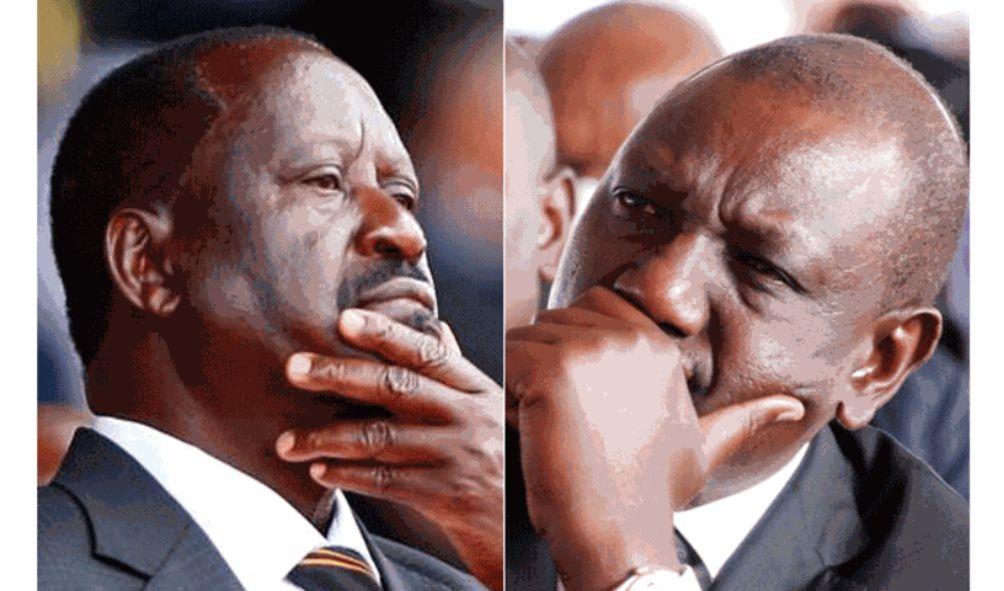Why Ruto Could Replace Raila as Mount Kenya’s Scarecrow in the 2027 Political Shift
The political landscape in Kenya is shifting as President Ruto’s reconciliation with opposition leader Raila Odinga, who is eyeing a significant role in the African Union, signals the diminishing influence of using Odinga as a political threat in Mt Kenya during elections.
In past elections, Mt Kenya voters predominantly opposed Odinga, who was consistently painted as the antagonist by political rivals. Many local leaders built their careers on this sentiment, capitalizing on the fear and mistrust toward him.
Ruto’s newfound alliance with Odinga has unsettled regional political figures, including Deputy President Rigathi Gachagua. Analysts suggest this move could put Ruto and Odinga on the same side in 2027, compelling Mt Kenya to either back Ruto’s reelection or switch allegiance.
Charles Mwangi, a lecturer at JKUAT, warns that Ruto risks inheriting the “scarecrow” label previously attached to Odinga. He argues that dissatisfaction with governance has shifted public frustration in Mt Kenya from Odinga to Ruto, as evidenced by the widespread support for recent Gen Z-led protests.
The incorporation of Odinga’s allies into a broad-based cabinet has been perceived as a betrayal by Mt Kenya voters, who contributed significantly to Ruto’s electoral victory.
ALSO READ:
- “Two Groups, One Agenda”: Gachagua Accuses Raila of Secret Political Deals
- Exclusive: Ida Odinga’s 75th Birthday Party in Karen (Photos)
- FKF President Discloses Exact Amount Paid to Harambee Stars Players
- Gachagua’s Ally Senator John Methu Admits Ruto Might Win 2027 Elections
- Maraga Explains Why He Hasn’t Campaigned in Kisii Despite 2027 Bid
Political analyst Gasper Odhiambo believes Mt Kenya’s historical animosity towards Odinga will be outdated in 2027, regardless of whether Odinga runs for office or not. He notes that despite the region’s repeated rejection of Odinga, he has consistently managed to stay relevant in national politics.
Odhiambo predicts that Mt Kenya could rally behind Odinga in 2027 as a way to retaliate against Ruto for perceived betrayals. Jubilee Party Secretary General Jeremiah Kioni asserts that the region will unite against the current administration, regardless of who leads the opposition.
UDA Secretary General Hassan Omar dismisses these claims, emphasizing that tribal politics will no longer dictate electoral outcomes. He warns that those relying on divisive tactics will soon face the complexities of sustaining political relevance.
This changing political climate in Mt Kenya is causing concern among local leaders who recognize the need for a new strategy without Odinga as the traditional scapegoat.
University professor Macharia Munene suggests that the region’s political slogans are rooted in fear, which is now giving rise to a generational shift. This shift is evident as younger politicians in the region push for modern approaches, including the promotion of female leaders like Governors Anne Waiguru and Cecily Mbarire.
Former Bahati MP Kimani Ngunjiri reflects on the region’s political history, noting that Mt Kenya has consistently voted against Odinga’s influence. However, this opposition has often resulted in unexpected alliances, such as Odinga’s handshake with President Kenyatta and his subsequent role in the government.
ALSO READ: John Mbadi Unveils Eco Levy Comeback, and 48 Other Amendments Rejected in Finance Bill
Nyeri Governor Mutahi Kahiga expresses frustration over Ruto’s perceived alignment with Odinga, despite Mt Kenya’s overwhelming support for him in the last election. Kahiga acknowledges the need to accept Odinga’s involvement in the government while hoping it doesn’t lead to further instability.
Deputy President Gachagua’s recent remarks on vernacular radio reveal a growing sentiment that the region’s historical enmity towards Odinga may have been misplaced. He now seeks to foster a better relationship with Odinga, indicating a shift in political dynamics.
Long-serving administrator Joseph Kaguthi observes that the longstanding rivalry between Mt Kenya and Odinga’s region, rooted in historical conflicts, is losing relevance. Kaguthi attributes this change to Odinga’s advancing age, the emergence of a generation less concerned with tribal loyalties, and a growing fatigue among voters.
Kaguthi believes that with Odinga nearing the end of his political career, Mt Kenya’s political power brokers must find new strategies to maintain influence.
Naivasha MP Jayne Kihara acknowledges the region’s disillusionment with past political maneuvers but urges a reconsideration of their 2027 strategy. She suggests that Mt Kenya might opt out of the next election, highlighting a growing distrust in the electoral process.
Maragua MP Mary wa Maua emphasizes that the region’s loyalty now lies with Deputy President Gachagua, signaling a shift away from emotional voting based on historical grievances.
ALSO READ: DP Gachagua Threatens to Withdraw Support from Betraying Politicians Ahead of 2027 Election: ‘You Will Need Me”
Former Gatanga MP Nduati Ngugi outlines three possible scenarios for Odinga’s role in the next election: running with a strong Mt Kenya running mate, supporting a preferred candidate, or withdrawing from politics altogether. Ngugi suggests that Mt Kenya might vote for Odinga, hoping he would eventually hand over power to a Mt Kenya leader due to his age.
Ngugi warns that if Odinga endorses Ruto for a second term, it could lead to significant divisions within the region, especially if the running mate is from outside Mt Kenya.
Former Civil Service CS Moses Kuria cautions that the region’s focus should shift from political hatred to securing tangible benefits from governance, particularly economic empowerment.
Why Ruto Could Replace Raila as Mount Kenya’s Scarecrow in the 2027 Political Shift
